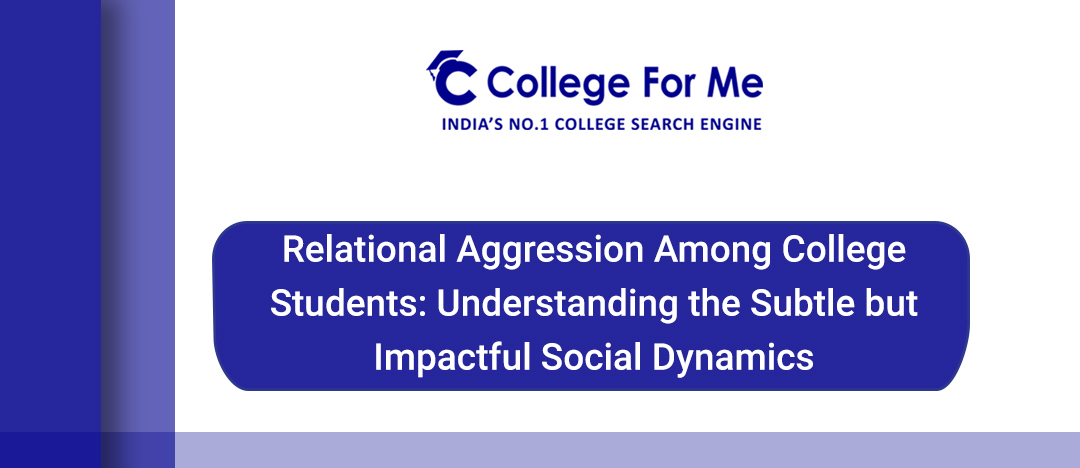Career Scopes Of A B.Tech. Student
There is a high demand for B.Tech. degree holders in the private sector, yet, there is also the opti...

In the realm of college life, students often encounter new experiences and challenges while navigating their way through academic demands, social circles, and personal growth. Among the myriad of issues that arise in this environment, one that deserves closer examination is relational aggression. Unlike physical aggression, which involves direct harm or violence, relational aggression is a form of covert or indirect aggression that primarily targets social relationships, causing emotional harm and distress to the victims. This subtle yet impactful behavior has gained significant attention in recent years due to its prevalence and potential consequences on students' mental health and overall well-being.
What is Relational Aggression?
Relational aggression is a form of social manipulation in which individuals use tactics such as spreading rumors, exclusion, social isolation, gossip, and cyberbullying to undermine the social standing and relationships of others. It is commonly employed as a means to gain power, control, or social dominance within a group. The aggressors aim to weaken their victims' social bonds and cause emotional pain without resorting to direct confrontations or physical violence.
Prevalence of Relational Aggression Among College Students
Relational aggression is not limited to any specific age group or setting, but its prevalence is notably high among college students. This can be attributed to various factors, including the transitional nature of college life, the forming of new social cliques, and the competitive environment surrounding academics and extracurricular activities. Additionally, the rise of social media has provided new platforms for relational aggression to manifest through cyberbullying and online harassment.
Impacts on Victims
Though relational aggression may not leave visible scars, its emotional toll on victims can be significant. Students who experience relational aggression often report feelings of anxiety, depression, loneliness, and a diminished sense of self-worth. Unlike physical aggression, which is more straightforward to identify and address, relational aggression can be challenging for victims and even bystanders to recognize and intervene effectively.
Academic Performance and Mental Health
The consequences of relational aggression can extend beyond emotional distress and negatively affect academic performance. Students who are targeted may experience difficulties concentrating on their studies, leading to a decline in grades. Additionally, the stress and isolation resulting from the aggression can exacerbate pre-existing mental health issues or trigger the onset of mental health conditions like depression and anxiety.
Cyberbullying and Online Aggression
With the increasing prevalence of social media, college students are particularly vulnerable to cyberbullying and online aggression. Hurtful messages, rumors, and exclusionary tactics can spread rapidly through digital platforms, reaching a large audience and intensifying the impact on the victim's mental well-being. Furthermore, the anonymity provided by online interactions may embolden aggressors to engage in behavior they wouldn't consider in face-to-face settings.
Addressing Relational Aggression: The Role of Colleges and Universities
Colleges and universities play a crucial role in addressing relational aggression among their student population. Creating awareness through educational programs, workshops, and discussions about the different forms of aggression and their consequences is vital. Promoting a culture of empathy, respect, and inclusivity can help reduce the prevalence of aggression on campuses.
Furthermore, implementing clear and well-publicized policies regarding bullying, harassment, and cyberbullying is essential for maintaining a safe and supportive environment for all students. These policies should include guidelines on reporting incidents, investigation procedures, and support systems for victims.
Support Systems for Victims
Colleges must provide accessible and confidential support systems for victims of relational aggression. Counseling services, peer support groups, and resources for online safety are essential in helping students cope with the emotional repercussions of such experiences. Encouraging open communication and fostering a non-judgmental atmosphere can also empower victims to seek help and assistance.
Conclusion: Relational aggression is a concerning issue that can significantly impact the college experience of students. Its subtle nature and indirect tactics make it difficult to address, but the consequences on victims' mental health and academic performance are undeniable. By fostering a culture of empathy, respect, and inclusivity, along with clear policies and accessible support systems, colleges and universities can take meaningful steps toward combating relational aggression and creating a safer and more nurturing campus environment for all students.

There is a high demand for B.Tech. degree holders in the private sector, yet, there is also the opti...

If you are looking for a bright and prospective career, then getting a B.Tech. in CSE must be under ...
Comments (0)